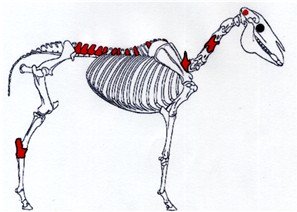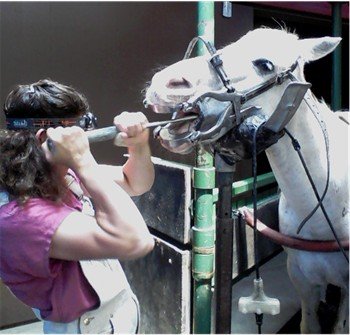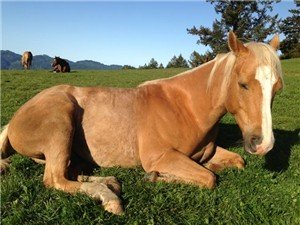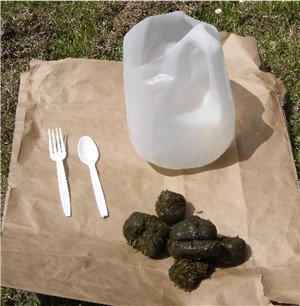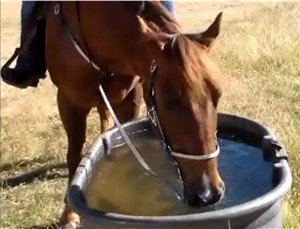Horse Myth Busted
Have You Fallen for One of these Myths About Horses?
Horse myths run a muck around the barn and on the internet! Ever wonder if some of the stuff you hear about horses is really true? You don’t have to be around horses long before you start to hear some pretty interesting theories….Don't be duped by old wives tales of the equine world. Let's set the record straight!

English
vs. Western Riding Myth:
English riding is more correct and thus better.
Dressage riding is considered to be the crème de la crème of horsemanship. The fact of the matter is that dressage can be preformed in an English saddle, a Western saddle, an Australian saddle or with no saddle at all. The saddle does not dictate the rider. Rather it’s the skill set brought to the saddle that determines the ‘correctness’ of the riding!
Even so, I'm afraid this is one of those horse myths that will not go away any time soon. If you ride any style other than English, don't let anyone convince you that your style is less than perfect. It's just not so.

The Wild Mustang Horse Myth:
Mustangs
can survive on things other horses can’t.
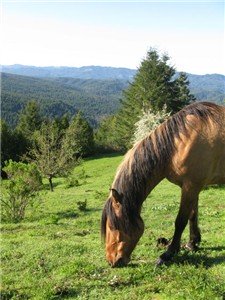 Mustangs need good feed too.
Mustangs need good feed too.Many people adopt a wild horse with the good intentions of training the animal. Often they find themselves intimidated by the wild horse and leave the animal to fend for themselves out to pasture, thinking the horse has survived in the wild they can survive out in the pasture too.
It’s a flawed assumption. As a result many of them are inadvertently starved or malnourished.
Horse myths like this are dangerous and should be challenged.
Out in the wild the horse had the opportunity to travel to find food sources. Penned in a confined space, when the graze is depleted or insufficient, the horse simply starves. Mustang horses have the same nutritional requirements as their domestic born counterparts.

The Old Age Myth:
A horse is
‘old’ by the age of 15. It’s all down hill from there.
The implication is that an ‘old’ horse has lost its usefulness. Not so my friend. Did you know that many of the horses competing in the Equestrian Olympics are in their late teens? These are incredibly conditioned athletes competing in the ridiculously challenging sports of jumping, eventing and dressage.
The oldest horse to compete in the 2012 London Olympics was 20 year old 'Lenamore' who came away with a team bronze metal, and placed 29th out of 53 finishers.
Those so called ‘old’ horses are winning medals!

The Equine Chiropractic Horse Myth:
Chiropractics
is fake hocus pocus medicine.
Did you know that nearly every horse that has a rearing problem also has their poll and/or upper neck out of alignment? The rearing is often in response to discomfort. A chiropractic adjustment to correct the misalignment of the neck has corrected rearing, stumbling, bridling and cinching problems in horses. Who knew? Now you do.
Caution: Only use a Certified Veterinary Chiropractor. Check with your local vet for references.
Next time you have an unresolved behavioral issue with a horse, consider a chiropractic exam to rule out the possibility of muscle pain and stiffness.

The Beet Pulp Horse Myth:
If fed dry, beet pulp will swell up inside your horse and kill them.
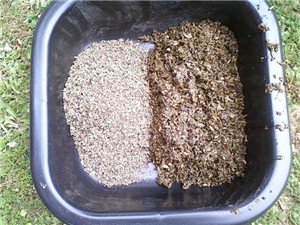 Shredded beet pulp shown dry and wet
Shredded beet pulp shown dry and wetYes beet pulp will swell twice its size when soaked in water. No, dry beet pulp will not kill a horse.
Beet pulp is much easier to chew and digest when it has been soaked in water. It is often used to fatten thin horses. It’s also used as a hay substitute for horses with no teeth or bad teeth.
When it is being used to feed horses with ‘compromised’ feeding issues, it only makes sense to soak the pulp to allow the animal to get the most from the meal.
If you are adding beet pellets to the grain rations of a healthy horse with no dental problems, it is not necessary to soak it. When given free access to fresh water, healthy horses will naturally get the water they need for digestion.

The Horses with White Hooves Myth:
White
hooves are weak, black hooves and strong and stripped hooves are best.
This is an old wives tale if I've ever heard one! Hoof color has absolutely no bearing on the strength or hardness of the hoof.
This myth is so pervasive that all race horses have black hooves. After all, who wants to bet on a horse with a white hoof? Many thoroughbreds have terrible feet! (relatively speaking)
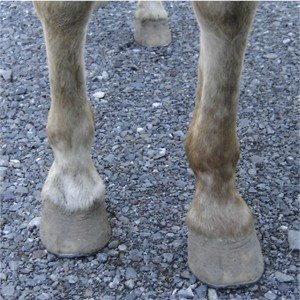 White hooves are strong!
White hooves are strong!Your farrier will be the first to tell you that hoof color does not matter. They can give you one example after another of solid sound wonderfully white hooves and horses with poor dark hooves. Care, nutrition and heredity, not the color; determine the quality of the hoof.
One can only guess how some horse myths get started, but I do know this, they don't have to be perpetuated. If you ever hear anything concerning horses that sounds even remotely fishy, do a little research to flesh out the truth.
When you hear someone spreading one of these horse myths, you can set the record straight. As horsemen, we'll all be better for it.
More Equine Topics You May Enjoy
Easy Sand Test
Easy Sand Test - An easy sand test at home is a simple way to find out if your horse has sand in their gut. If your horse tests positive, you can do something about it.

